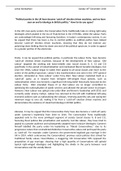Leena Ramlakhan Sunday 30th December 2018
“Political parties in the UK have become ‘catch-all’ election driven machines, and we have
seen an end to ideology in British politics.” How far do you agree?
In the UK’s two-party system, the Conservative Party traditionally take on strong right-wing
ideologies which peaked in the era of Thatcherism in the 1970/80s, whilst the Labour Party
are contrastingly left-wing and favouring Socialism. In today’s contemporary society, it can
be argued that there has been a rise in centrist politics as political parties have indeed
become ‘catch-all’ election driven machines, meaning that they do not endorse any
polarising views limiting them far down one end of the political spectrum, in order to appeal
to a greater portion of the electorate.
Firstly, it can be argued that political parties, in particular the Labour Party, have become
‘catch-all’ election driven machines, because of the development of New Labour. ‘Old
Labour’ targeted the working and lower-middle class (social classes D, E, C2 and C3)
specifically in the period of industrialisation and maintained liberal Socialist ideologies, but
since the 1960s, Labour began to widen their appeal to all social classes and move to the
centre of the political spectrum. Labour’s key transformation was seen in the 1997 general
election, rebranded as ‘New Labour’ under Tony Blair. New Labour marketed itself as a
‘catch-all’ party, as it strayed from stringent left-winged fiscal policies, such as
nationalisation which was formerly a significant left-wing belief historically favoured by the
Labour Party. Blair amended Clause IV so that Labour are no longer committed to
optimising the nationalisation of public services and allowed the private sector to prosper.
However, New Labour was upkept only under Blair and Brown’s leadership until 2010, and
currently under Jeremy Corbyn, Labour has returned to the left with traditional left-wing
economic policies such as nationalising the railways, reversing austerity cuts and raising the
minimum wage to over £8, making it far from a ‘catch-all’ election driven machine and
demonstrates the existence of stead-fast ideology in British politics.
Likewise, it may be argued that the Conservative Party have also become a ‘catch-all’ party
under Cameron’s leadership from 2010 to 2016. The Conservative Party traditionally
appealed only to the more privileged segment of society (social classes A, B and C1),
favouring fiscal policies like privatisation and austerity, but like Labour, they have tried to
appeal to a greater audience and subsequently adapted more inclusive ideologies. Cameron
himself labelled the party under his leadership as “liberal Conservatives,” due to its
progressive nature that contradicted distinctive Conservative values and portrayed the party
as ‘catch-all’. For example, under Cameron, the government legalised gay marriage in the
UK in 2014, which contravenes the Conservatives’ previous social policies that strived for
traditional family values. Nevertheless, a staggering 136 Conservative MPs opposed the
proposition of gay marriage, showing that a high quantity of Conservatives still uphold
typical right-winged ideologies and highlighting the divide in the party between rural
Conservatives and the socially liberal.




